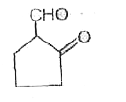An organic compound does not reacts with Tollen's reagent but undergoes Baeyer Villiger oxidation. The compound is
CH≡C−CH2COCH3

CH3CHO
CH3−C∣∣O−CH3
The correct Answer is:D
To solve the question, we need to analyze the characteristics of the organic compound based on the information provided. The compound does not react with Tollen's reagent but undergoes Baeyer-Villiger oxidation.
1. Understanding Tollen's Reagent:
- Tollen's reagent is used to test for aldehydes. Aldehydes reduce Tollen's reagent, resulting in a silver mirror formation.
- If a compound does not react with Tollen's reagent, it suggests that the compound is not an aldehyde.
2. Understanding Baeyer-Villiger Oxidation:
- Baeyer-Villiger oxidation is a reaction that typically involves the oxidation of ketones to esters using peracids.
- This reaction is characteristic of ketones, which can undergo this transformation.
3. Analyzing the Options:
- Option A: A terminal alkyne. Terminal alkynes can react with Tollen's reagent, so this cannot be the answer.
- Option B: An aldehyde. Since aldehydes react with Tollen's reagent, this cannot be the answer.
- Option C: Another aldehyde. Again, since aldehydes react with Tollen's reagent, this cannot be the answer.
- Option D: A ketone. Ketones do not react with Tollen's reagent and can undergo Baeyer-Villiger oxidation.
4. Conclusion:
- Since the compound does not react with Tollen's reagent (indicating it is not an aldehyde) and can undergo Baeyer-Villiger oxidation (indicating it is likely a ketone), the correct answer is Option D, which is a ketone.
Final Answer:
The compound is a ketone (Option D).
---
- Tollen's reagent is used to test for aldehydes. Aldehydes reduce Tollen's reagent, resulting in a silver mirror formation.
- If a compound does not react with Tollen's reagent, it suggests that the compound is not an aldehyde.
- Baeyer-Villiger oxidation is a reaction that typically involves the oxidation of ketones to esters using peracids.
- This reaction is characteristic of ketones, which can undergo this transformation.
- Option A: A terminal alkyne. Terminal alkynes can react with Tollen's reagent, so this cannot be the answer.
- Option B: An aldehyde. Since aldehydes react with Tollen's reagent, this cannot be the answer.
- Option C: Another aldehyde. Again, since aldehydes react with Tollen's reagent, this cannot be the answer.
- Option D: A ketone. Ketones do not react with Tollen's reagent and can undergo Baeyer-Villiger oxidation.
- Since the compound does not react with Tollen's reagent (indicating it is not an aldehyde) and can undergo Baeyer-Villiger oxidation (indicating it is likely a ketone), the correct answer is Option D, which is a ketone.
The compound is a ketone (Option D).
Similar Questions
Knowledge Check
Which does not react with tollen's reagent?
A BCH3−C≡CHCH−O∣∣C−OHDCH3−O∣∣C−CH3
BCH3−C≡CHCH−O∣∣C−OHDCH3−O∣∣C−CH3Which organic compound can reduces Tollen's reagent ?
AOxalic acidBCitric acidCAcetic acidDFormic acidWhich of the following compound does not react with Tollen's reagent?
A B
B C
C D
D
Ethylene reacts with Baeyer's reagent to given
View SolutionEthylene reacts with Baeyer's reagent to give
View SolutionConsider the following Baeyer-Villiger oxidation.

View SolutionEthylene reacts with Baeyer's reagent to given
View SolutionWhich of the following compound does not react with Lucas reagent ?
View Solution
